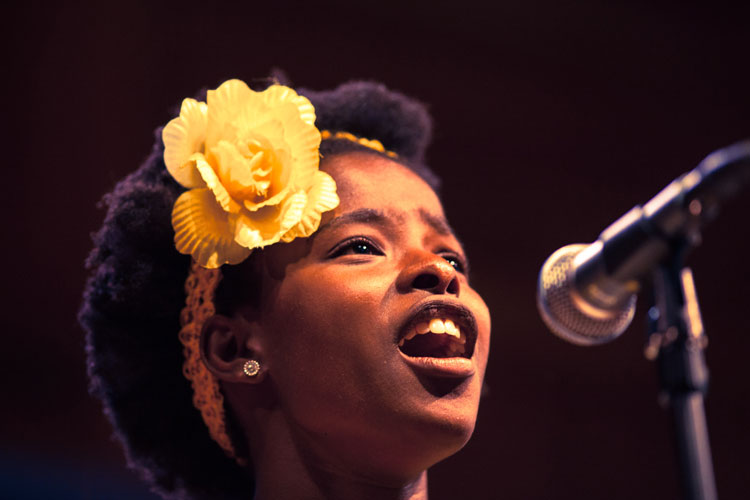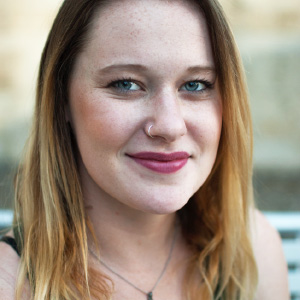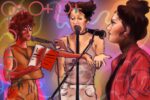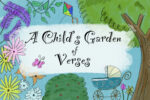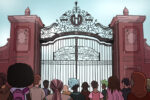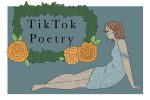Recently named the country’s first National Youth Poet Laureate, Harvard student Amanda Gorman is already a published poet with her collection, “The One for Whom Food Is Not Enough.” Gorman also strives to spread the power of the arts to others across the world, as she has founded One Pen One Page, an organization that encourages young women poets and publishes their work online.
In addition, while serving as a United Nations youth delegate in New York City, Gorman has had a direct impact on advocacy for young women, and she continues to promote their welfare through her writing, the organizations she’s involved with and the media features she has used as platforms. I had the opportunity to speak with the poet about her work as an advocate for women’s rights, her poetry and what the next few years of undergrad might have in store for her.
Brittany Sodic: You’ve recently just completed your freshman year at Harvard. How do you manage to continue your work as an active advocate for creative arts while also focusing on your schoolwork?
Amanda Gorman: Balancing my work, school and personal life definitely takes some time management skills. Most of it is sitting down and thinking about my priorities—I want to have ample time to spend with the people I love, give back to my community, do well in school and have moments to self-care. Having all these tasks in the air means that I have to overlap them as much as possible. If I have a school project, how can I bring poetry into it? If I’m speaking in a city, how can I interview someone for the film I’m directing? With practice, a lot of these decisions become more instinctive, making it easier over time.
BS: Do you consider yourself to be an activist or a poet first? Or are those two things inextricably linked together for you?
AG: Being a poet and an activist are interwoven identities for me. I write to advocate; I advocate to give myself purpose and meaning for writing.
BS: As such a young woman operating in official capacities in places such as the UN and even the White House at one point, did you ever experience any discrimination based upon your age, such as being taken less seriously?
AG: Unfortunately experiencing racial, gender, and age-based discrimination is nothing new to me. I wrote a piece for Mariashriver.com about going to the UN as a youth delegate and not being taken seriously. Many of the panel moderators at the UN Commission on the Status of Women would make well-meaning, but simultaneously patronizing, comments about my age. Over time I learned that just as constantly as you are discriminated against, you must be as consistent in staying true to yourself and holding your work to your own expectations, not those standards of people and institutions who misjudge you on account of your identity.
BS: You struggled with a speech impediment from a young age, but now you’re a spoken-word performer and poet. How did your struggle with speech influence you as a young writer and artist?
AG: Having a speech impediment taught me from a young age to challenge traditional perceptions of the definition of voice, performance and artistry. I felt like there was such a strange paradox inside of me—on the one hand, I didn’t like to talk about my speech impediment; it was a source of embarrassment, yet on the other, I felt drawn to spoken word performance. I came to love my voice, not just my vocal voice, but also my writing voice, my activist voice. I learned it was nothing to be embarrassed about, but something to celebrate; it makes me the creative advocate I am. Reading about Maya Angelou, who was mute after being raped, helped show me the wide plethora of poetic voices who have used their pens to speak up.
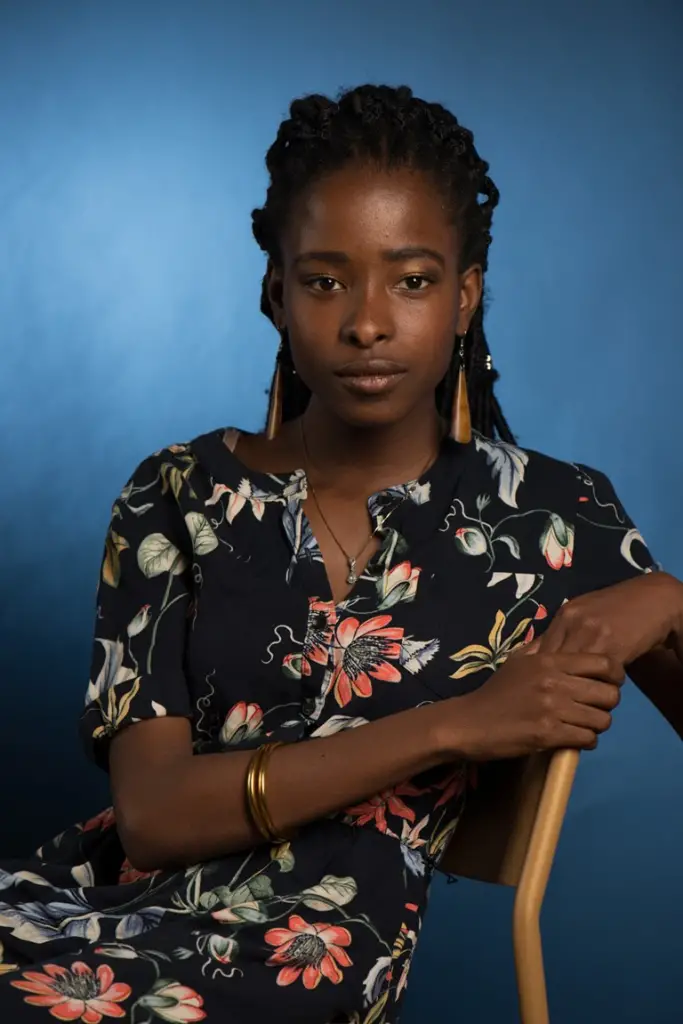
BS: When performing your pieces, are you ever worried about the audience’s reception of them, because of your speech impediment? Or do you see it as an asset in your storytelling?
AG: In my journey as a spoken-word poet and activist, I experience anxiety before a performance because of my speech impediment. Earlier on in my career, I’d actually delete or replace words in my poems because I couldn’t pronounce them as well as I’d hoped. Now I’ve gotten to a point where I’m like screw it—I might not be able to say that word perfectly—after all, what is perfect pronunciation anyways?—but there’s too much at stake for me to censor or monitor myself. I still get nervous sometimes, or frustrated and disheartened listening to interviews of myself, but it’s all worth it when I meet other girls who say: “We have the same speech impediment! You’ve inspired me to keep speaking up.” I see it as an incredible opportunity to connect with so many valuable, beautiful people whose voices have been overlooked.
BS: Your identity as a young black woman is a recurring theme for much of your poetry, such as in your piece “Mirror Mirror.” How do you think the intersectionality of your race and gender, and the biases and discrimination you’ve no doubt faced as a result, influences your writing?
AG: Being a black woman with a speech impediment raised by a single mother taught me to always look for untold stories. Growing up, I didn’t see narratives that reflected my experience, which inspired me to write poems that speak to marginalized identities. A fun exercise I always try with my writing is to think: “What is a way to take a traditional narrative and infuse it with unheard voices? How can I take this and turn it upside down or think about it from a new perspective?” It’s those questions that excite me to pick up my pen in the first place.
BS: How did your upbringing in the progressive, diverse and artistic environment of LA influence you as a writer and person? Do you think that had you been born and raised somewhere like, say, the conservative South, that you would have been different for it?
AG: I can’t speak of what growing up in other places might be like, but I can definitely talk about growing up in Los Angeles. In this diverse, vibrant city, I was exposed to different cultures and backgrounds early on. From Little Ethiopia to Chinatown, Santa Monica beach to the hot and cemented Downtown Los Angeles, I paid witness to a cornucopia of identities. I went to a school called New Roads on a scholarship, where I was a peer to people of varying socioeconomic statuses. Because of this upbringing I’ve always loved meeting people who are different from me, and incorporating that beautiful diversity into my writing. My friends are always a rainbow of races, sexual orientations, etc., and it’s great to be in a squad where we’re all so unique.
BS: Your mother was a teacher for much of your life. Did this impact how you view the importance of education?
AG: Having a mother as a sixth grade English teacher in an inner city public school gave me an up-close and personal view of how literacy influences young students. I realized that education can really be a life-or-death resource. That sounds dramatic, but to kids who grow up in these neighborhoods, it’s not. It’s reality. School and college is a pathway to get off the streets, to break a cycle. I wrote about this for the LA Youth Poet Laureate ceremony in a poem called Neighborhood Anthem. My mother worked so hard while raising three kids to get her doctorate and master’s degrees in Education. She inspires me every day to seek higher education not only for myself, but for the other students around me.
BS: As such a strong advocate for the creative arts and writing in the lives of young girls across the globe, can you explain why you have such a passion for not only pursuing the arts in your own life, but in expanding access to it in others’ lives as well?
AG: I love the quote: “A rising tide lifts all boats.” While I love exploring the arts for myself, it’s nothing compared to sharing that love with other young people. It’s amazing to give a workshop on poetry and see young girls’ eyes light up as they learn to trust their poetic instinct. Just as much as the arts lift me, the rising wave of young artists raises me higher every day.
BS: In an increasingly politicized climate, how do you think the role of the arts and writing can help us tackle the problems that we as a nation face?
AG: I firmly believe that the arts are an excellent place to heal wounds and build bridges. Looking to Ancient Greece and the artistry of Athens, I’ve always viewed the arts as the civilizing signs of a democracy. Right now, when our American democracy feels particularly divided around what that democracy should look like, arts are the place to have those dialogues. For example, I recently judged Brave New School’s poetry competition, which encouraged students to think of how they would change schools or improve their educational experience. Arts are the piston that can help move democratic civilizations along, and I’m excited to see that happening during divisive times.
BS: Have you seen a difference in the types of voices in the arts and literature that are being given more attention, i.e. a shift from white, hetero, male artists to those of women, people of color, etc.? What do you think can be done to encourage publishers and the media to more often share these experiences of different kinds of people?
AG: The movie, media and publishing industries are coming to understand that it’s not only morally sound, but economically logical, to include previously overlooked identities into the stories they produce. I would say never underestimate your economic power to make a stand. I make a conscious decision to invest my own personal capital—no matter how small—to buy movie tickets, books or pieces that promote representation. Even if you can give only a few dollars to a media source that speaks to your values of genuine diversity, inclusivity and representation, that makes a difference.
BS: Who are the most influential artists, be it poets, writers, musicians, painters, etc., that have impacted you as a person, and a poet?
AG: I’ve always looked up to Maya Angelou. Not only did she overcome a period of being mute after being molested, but she was also a fantastic humanitarian and teacher. I always tell myself that I don’t just want to write, I want to do right, and Maya is a great example of that. I’m also deeply grateful to my writing mentors, like my poet mentor Dinah Berland or the English teachers who’ve changed my life.
BS: What is your process for writing? Do you have a tried-and-true method of creation, or does it differ based upon what you’re working on?
AG: My method for writing really varies from piece to piece. But when I’m struck by inspiration, it always looks the same. I grab a pen—I prefer the permanency of ink—and my journal, and I play instrumental music, like movie scores by Michael Giacchino. I can’t write to music with lyrics, but music is a crucial part of my process. It helps remind me that each poem has its own rhythm.
BS: Do you have any more projects, poetry books or other exciting things related to your work happening any time soon?
AG: I’m going on a national tour as a United States Youth Poet Laureate, which has been a lot of fun. I’ve gotten to visit the Library of Congress, which was a dream come true. An upcoming project I’m excited to be working on is an intersectional feminist virtual reality experience I’m directing. I got funding from an OZY Genius Grant, which I’m using to document the stories of inspirational young women and girls through 360-degree footage. I’ve been interviewing girl change-makers around the country, and I can’t wait to share their empowering narratives through VR.


